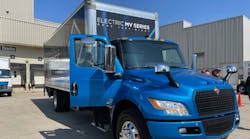While fleets are open to new technology, they are not necessarily open to making compromises to incorporate that technology into their operations. We’ve seen this with many fuel efficiency technologies for diesel semis, but now more so with the new, significant ones such as electric, hydrogen, and automation. I was reminded of this when I was on a panel on Battery Electric Vehicle Spec’ing at the recent Technology & Maintenance Council’s Annual Meeting & Transportation Exhibition.
Jeff Glover, director of maintenance and engineering for UPS, and Bill Bliem, senior vice president, fleet services at NFI, were on the panel giving the real-world view of integrating EVs into a fleet.
Glover said he was looking for a seamless integration of the new technology in several areas including payload, range/charging, environment/temperature, performance and reliability, OE support network and driver comfort/safety. For UPS, the performance and reliability bar is high and the company expects its vehicles to have a life expectancy of 20-plus years.
See also: EV opportunities are blooming in terminal yards
When adding EVs, Glover said it is important to have a cohesive plan in place. He also said that testing is important and encouraged fleets to spec EVs to the specs they know work.
NFI has a long history with alternative-fueled vehicles and continues to use them in its operation. Bliem shared NFI’s lessons learned including reminding fleets to include the MPG improvement specs from their diesel-powered equipment in their electric vehicles. He also said that driver training is essential for EV success and encouraged fleets to talk to their utility companies “early and often.”
Perhaps Glover summed up fleet expectations best when he said, “Don't accept variations that will cause you to change your culture.” I think EV manufacturers would be wise to listen to that. They need to work hard to make sure the electric vehicles they are bringing to market will meet fleet expectations. This is a case where if EV manufacturers want to be successful, they need to listen to what fleets want in terms of operational performance of EVs. Fleets expect the EVs to perform as well as their current diesel-powered vehicles. They don’t want to fit their operations to the trucks, but rather want the trucks to fit their operations.
See also: Fleet electrification: Go or no-go for launch?
These early deployers of EVs like UPS and NFI have had a history of success in integrating new technologies into their operations while maintaining operational excellence. They have high expectations for the EVs they are testing and expect manufacturers to make strides in battery weight reduction, range, ability to operate in a wide variety of temperatures, etc.
Fleets are willing to be test beds for new technology including EVs, but they are not willing to throw their successful business models out the window to do so. EV manufacturers who listen to what fleets are saying and address their concerns will be the ones who win the day.
Michael Roeth has worked in the commercial vehicle industry for nearly 30 years, most recently as executive director of the North American Council for Freight Efficiency. He serves on the second National Academy of Sciences Committee on Technologies and Approaches for Reducing the Fuel Consumption of Medium and Heavy-Duty Vehicles and has held various positions in engineering, quality, sales, and plant management with Navistar and Behr/Cummins.




